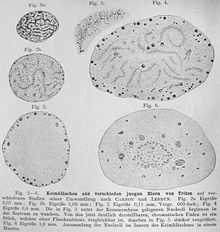Oscar Hertwig
| Oscar Hertwig | |
|---|---|
 Oscar Hertwig | |
| Born |
21 April 1849 Friedberg, Hesse |
| Died |
25 October 1922 Berlin |
| Nationality | German |
| Fields | zoology |
| Known for | protists |

Oscar Hertwig (21 April 1849, in Friedberg – 25 October 1922, in Berlin) was a German zoologist and professor, who also wrote about the theory of evolution circa 1916, over 55 years after Charles Darwin's book The Origin of Species. He was the elder brother of zoologist-professor Richard Hertwig (1850–1937).The Hertwig brothers were the most eminent scholars of Ernst Haeckel (and Carl Gegenbaur) from the University of Jena. They were independent of Haeckel's philosophical speculations but took his ideas in a positive way to widen their concepts in zoology. Initially, between 1879–1883, they performed embryological studies, especially on the theory of the coelom (1881), the fluid-filled body cavity. These problems were based on the phylogenetic theorems of Haeckel, i.e. the biogenic theory (German = biogenetisches Grundgesetz), and the "gastraea theory".
Within 10 years, the two brothers moved apart to the north and south of Germany. Oscar Hertwig later became a professor of anatomy in 1888 in Berlin; however, Richard Hertwig had moved 3 years prior, becoming a professor of zoology in Munich from 1885–1925, at Ludwig Maximilians Universität, where he served the last 40 years of his 50-year career as a professor at 4 universities.
Richard's research focused on protists (the relationship between the nucleus and the plasm = "Kern-Plasma-Relation"), as well as on developmental physiological studies on sea urchins and frogs. He also wrote a leading Zoology textbook.
Oscar Hertwig was a leader in the field of comparative and causal animal-developmental history. He also wrote a leading textbook. He discovered fertilization of sea urchins, he recognized the role of the cell nucleus during inheritance and chromosome reduction during meiosis: in 1876, he found that fertilization includes the penetration of a spermatozoon into an egg cell. While Oscar was well interested in developmental biology, he was opposed to chance as assumed in Charles Darwin´s theory. His most important theoretical book was: "Das Werden der Organismen, eine Widerlegung der Darwinschen Zufallslehre" (Jena, 1916) (translation: "The Origin of Organisms - a Refutation of Darwin's Theory of Chance").
Hertwig was elected a member of the Royal Swedish Academy of Sciences in 1903.
Oscar Hertwig is known as Oscar Hedwig in the book "Who discovered what when" by David Ellyard. A history of the discovery of fertilization for mammals including scientists like Hertwig and other workers is given by the book "The Mammalian Egg" by Austin.
See also
- Epigenetics.
- Evolution - concepts and history of evolutionary thought.
References
- Gill, P (1990), "Nature and nurture.", Med. J. Aust. (Apr 2, 1990) 152 (7): 386, PMID 2093819
- Weindling, P (1980), "Social concepts in anatomy: theories of the cell state of Oscar Hertwig (1849-1922) and Wilhelm Waldeyer (1836-1921).", The Society for the Social History of Medicine bulletin (Jun 1980) 26: 15–7, PMID 11610800
- Gras, N; Verchere, M; Santoro, J P (1975), "[The Oscar Hertwig centenary]", Revue d'odonto-stomatologie 4 (2): 135–40, PMID 1103253
- Churchill, F B (1970), "Hertwig, Weismann, and the meaning of reduction division circa 1890.", Isis; an international review devoted to the history of science and its cultural influences 61 (4): 429–57, PMID 4942056
- Cremer, T. 1985. Von der Zellenlehre zur Chromosomentheorie. Springer Vlg., Heidelberg. This German book can be downloaded here .
- Krafft, F., and A. Meyer-Abich (ed.). 1970. Große Naturwissenschaftler - Biographisches Lexikon. Fischer Bücherei GmbH, Frankfurt a. M. & Hamburg.
- Mol. Cell. Biol.-lecture, Heidelberg, D.-H. Lankenau.Early to recent key-discoveries: From Germline Theory to Modern Gene Modification
- Weindling, Paul. 1991. Darwinism and Social Darwinism in Imperial Germany: The Contribution of the Cell Biologist Oscar Hertwig (1849 - 1922). Forschungen zur Medizin- und Biologiegeschichte vol. 3, (Stuttgart: G. Fischer in association with Akademie der Wissenschaften und der Literatur Mainz, 1991),
- David Ellyard, "Who discovered what when", New Holland Publishers (Australia) Private Limited, 2005, p. 274.
- 6. C. R. Austin, "The mammalian egg", Blackwell Scientific Publications, Oxford, 1961.
External links
|